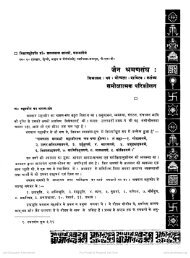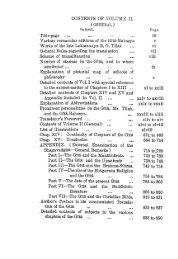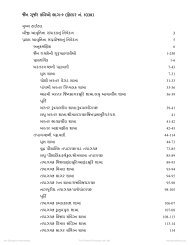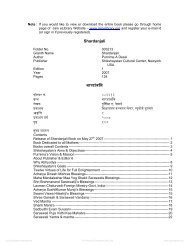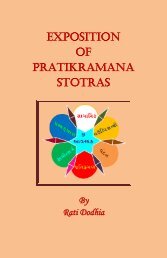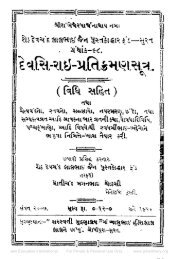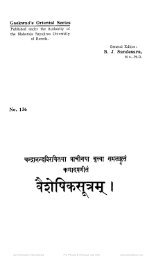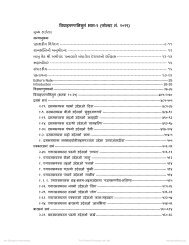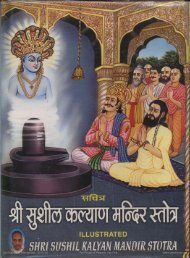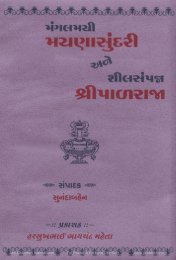You also want an ePaper? Increase the reach of your titles
YUMPU automatically turns print PDFs into web optimized ePapers that Google loves.
ARHAT VACANAKundakunda Jñånapî²ha, IndorerVol. - 23, Issue 1-2, January - June 2011, 73-81<strong>Jain</strong>ism, Social Consciousness andContemporary Issues Rajjan Kumar*AbstractModern societies are increasingly becoming socially unstable. Thereis no love between ethnic communities, religious groups, sociallyadvanced and socially backward groups, husband and wife, parentsand children. Groups and individuals are guided by narrow selfinterests.Due to these modern social evils communities as well asfamilies are affected. Peace, love, harmony, joy and mutual concernsare almost disappear or at the verge of vanishing. These are excitingtimes for <strong>Jain</strong>ism to project them as a true religionist with havingample amount of social conscience. ‘<strong>Jain</strong>a way of life was prone toascetic’ is gone. Today, it can provide a very positive, meaningfuland practical solution for contemporary issues.IntroductionReligion has always been a matter of discussion and dispute. To keepsocial consciousness is the key factor of every religion. Because the basicpurpose of all religions to ensure peace and happiness for the individual and toestablish harmony within human society. <strong>Jain</strong>ism, one of the prominent religionof world by mistaken has been projected as an ascetic based religion, and isquite difficult to justify its relevancy and practicability for modern society.<strong>Jain</strong>ism, Tîrthaµkaras & Social ConsciousnessThe word ‘Tîrtha´kara’ of <strong>Jain</strong>ism is ancient and technical. There are 24Tîrtha´karas. Tîrtha´karas of <strong>Jain</strong>as have the same place as God in otherreligion, however they are neither considered an incarnation of God nor regardedas a strange fellow in the divine creation. But Tîrtha´karas are emancipatedsoul and that is why considered like a God 1 . Tîrtha´kara did excellent penanceand religiously followed the path of self-control. With the utter purity of feelinghe pursued with diligence and rigorous exercise known as Tîrtha´kara-nåmakarma anubhågabandha and only then did he became a Tîrtha´kara 2 .Tîrtha´karas are known as the establisher of Dharm-tîrtha, which is calledas way way of religion. In <strong>Jain</strong>ism concept of tîrtha may be explained as shorebeyond the ocean.In <strong>Jain</strong>ism non-violence (ahi´så), truth (satya), non-stealing(asteya), chastity (brahmcarya) and non-possession (aparigraha) are dharmaand fourfold collectivity (caturvidhasa´gha)- ©rama¿a-©rama¿î and ©råvaka-Arhat *73Reader Vacana, & Head, 23 Department (1-2), 2011 of Applied Philosophy, M.J.P. Rohilkhand Arhat University, Vacana, Bareilly-243006 17(2-3), 2005 UP 73



